QuestionQUESTION: Hi Jessica,
3 days ago,our new 11 weeks old kitten boy arrived our home from a breeder of exotic shorthair persian.We noticed a serious issue in these 3 days very much in need help and direction:
He cries all the time when we are off the sight even in the same house.He loves to follow us around step by step and purring and playing,almost like close bounding attachment (which is great.) But he cries when we go to bathroom,or not able to be directly right next to him.This is really scary to us.He is vet checked, playful, happy, drinking lots of water, using litter box,responding to our voice well. BUT unseparated. Tried the ignore solution when he cries, but still......Is this going to be a ongoing issue?
There are no other pets in the house, and not planning to be.
We have 2 cats before, one from shelter, one also from a breeder all started the age of 8 weeks to 13 weeks.Never had any issues.Please help@!!!!!
ANSWER: Hi Rebecca,
It's normal for kittens in unfamiliar homes to be anxious and to express it vocally. Some kittens are clingier than others, and it all depends on individual personality, but he has gone from familiar surroundings with a family of litter mates to a strange home as an only pet, and he understandably feels a lot of confusion. I'm sure you can see why he seeks reassurance that he's not all alone. When kittens go to a new home, they often take comfort in the presence of human company, or other companion animals, if available. Since no other pets are available, it leaves the burden entirely up to you to ease him into a more independent lifestyle. But he won't grasp the concept of this all at once, so try to be patient and help him adjust to his new lifestyle before separating yourself from him too much. During this time, he does need your extra attention, and ignoring his calls for attention can exacerbate anxiety and lead to more permanent separation anxiety problems in the future.
If he doesn't adjust to your separation after a few weeks, you can start to put some rules in place. Put him in a separate room for a short amount of time, ignoring any crying, and gradually increase the time after several days. Ideally, leave him some treats in the room, maybe in a treat ball. Be sure to put toys in the room with him and praise him with extra attention when the time is up. If you don't make progress, you should consider using a pheromone product like Feliway. Finally, you may need to consult a vet about an antianxiety medication. But I don't think it will come to this.
Good luck!
Jessica
---------- FOLLOW-UP ----------
QUESTION: Hi Jessica,
Thanks for the advise, we'll give him time to adjust.
One more thing, he had been using litter box for 4-days since we got him w/o any problem. BUT today, I noticed he pooped in litter box PLUS found hard poops (4 to 5 pieces) in the other corner of the same room. We checked him twice a day and to pick up his poops, not sure why this happened just overnight.
Will this continue? What should we do? Hope this was an accident, but it doesn't look like. I know if kitten or cat using bathroom outside of the litter box is a bad sign to start with.
Best,
Rebecca
ANSWER: If the stool seemed very hard and small, it's possible he didn't use the box because he's constipated, and it hurt to defecate. Cats may avoid using their litter if it hurts to go. But if you find another accident, you will need to confine him to one small room with his box before it becomes a habit. A cage would actually be best, so that he can still interact with you to some degree. Some animal shelters rent out dog crates for training, and this would work fine - just keep him in here along with his litter, bed, food and toys until he's using the box with no accidents for a couple of weeks. Take him out for cuddles and play time, of course. But if you can't use a cage, a bathroom or other small, easy to clean room is second best.
---------- FOLLOW-UP ----------
QUESTION: Jessica,
I think you are right about my 3-month old kitten might have constipation. He is very active, but drinks lots of water constantly ( like thirsty) My vet said it's common for kitten drinks lot of water. But still I think it's the symptom of constipation especially he did pooped some very hard and tiny stools outside the litter box besides using litter box in regular basis. The breeder instructed me to giving Purina One hairball to the kitten as all time. I noticed it's kind of hard for him to chew on and also suspicious it's a possible cause of constipation. What do you think? Should I mix dry kitten food,or can food or else?
He is not a big eater even we eat hamburger or tuna in front of him, he doesn't seem interest at all. It's it normal? Or if it's a symptom of constipation?
I know I am asking a lot, just want him to live the best out of it.
Rebecca
AnswerHis lack of appetite for table food can be normal for him, as long as he's eating normal amounts of cat food. I would count it as a blessing! If he's not eating normal amounts of cat food, this IS a sign of constipation, and he should see a vet.
Opinions about what cats should eat vary very widely. Some recommend all dry, some say a mixture. More and more are leaning toward an all canned food diet, because some evidence suggests kidney problems result later in life from diets high in dry food. And many people even suggest feeding a raw food diet. But what's most important to recognize is that no one diet is right for every single cat. So even though the breeder recommended a dry diet for your kitten, if it's causing constipation, you should try a different type of food for the kitten.
In my opinion, we should feed a diet that most closely mimics what cats would eat in nature, and this is raw food. Nature's Variety raw diets are available already prepared at Petco as frozen pellets and medallions if you are interested in feeding this. Many cats will eat this very eagerly, and you will need to follow the portion guides to prevent overeating, but others need some coaxing to eat it.
If raw is not right for you, I recommend canned food. The water content in both of these types of foods will help prevent constipation.
If you like, you can still provide some dry food as between meal snacks.
If your kitten insists on dry food, you can try giving him a separate hairball treatment like Laxatone to help ease constipation. This is available at pet stores.

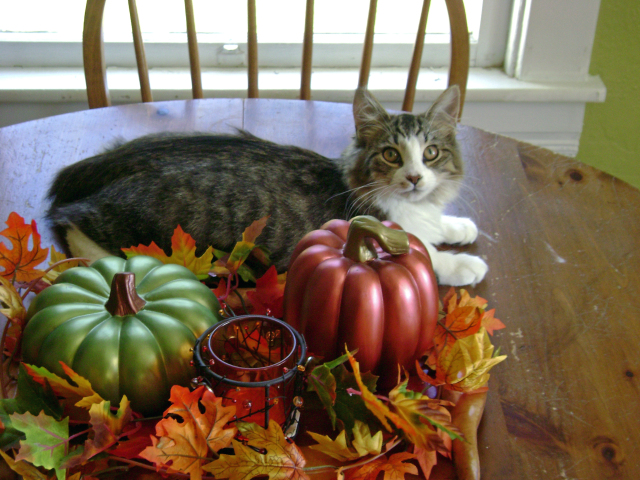 The breed of my 5 1/2 month old kitten
Question
Edmund 5 1/2 months ol
Hi, my husband and I re
The breed of my 5 1/2 month old kitten
Question
Edmund 5 1/2 months ol
Hi, my husband and I re
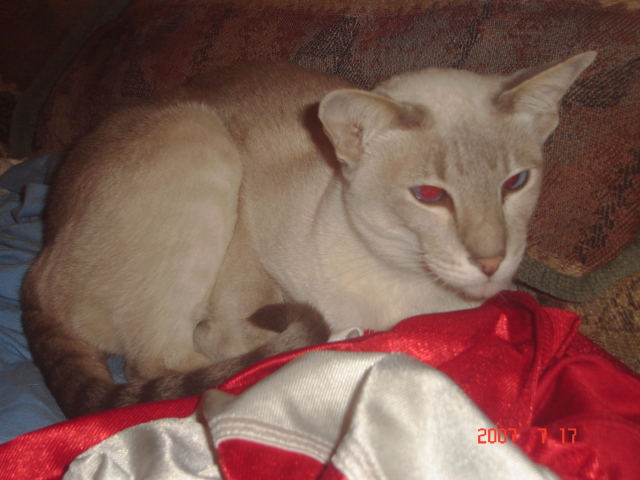 Siamese tracks feces around the house
Question
Dirty Foot
I recently adopted a wonderf
Siamese tracks feces around the house
Question
Dirty Foot
I recently adopted a wonderf
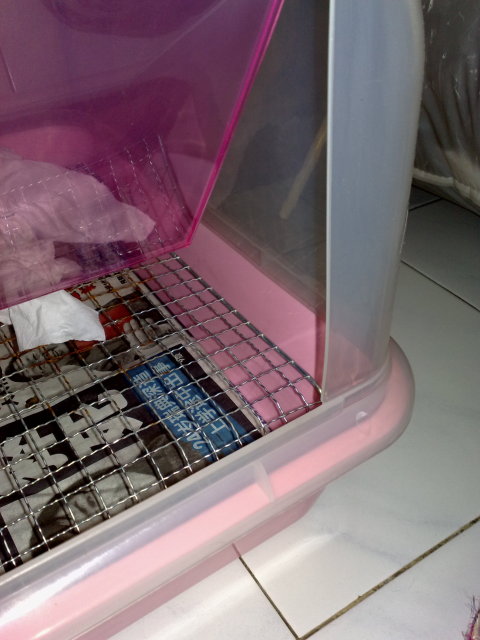 My cat doesnt piss on his litter box
QuestionLitter box
QUESTION: My 7months stray ca
My cat doesnt piss on his litter box
QuestionLitter box
QUESTION: My 7months stray ca
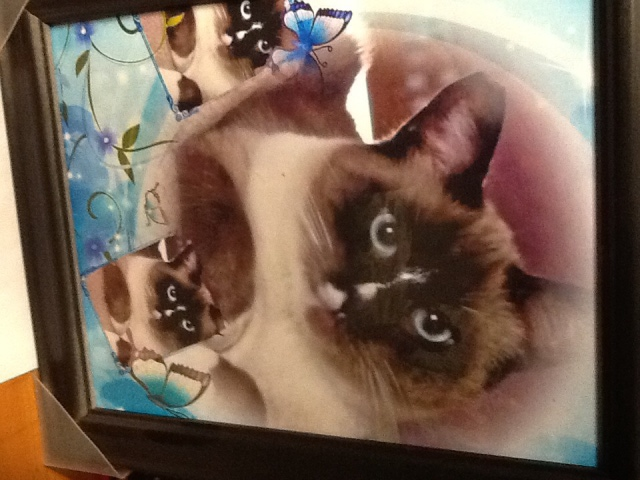 Ferel cat biting
QuestionQUESTION: I took in a ferel cat hes been here a
Ferel cat biting
QuestionQUESTION: I took in a ferel cat hes been here a
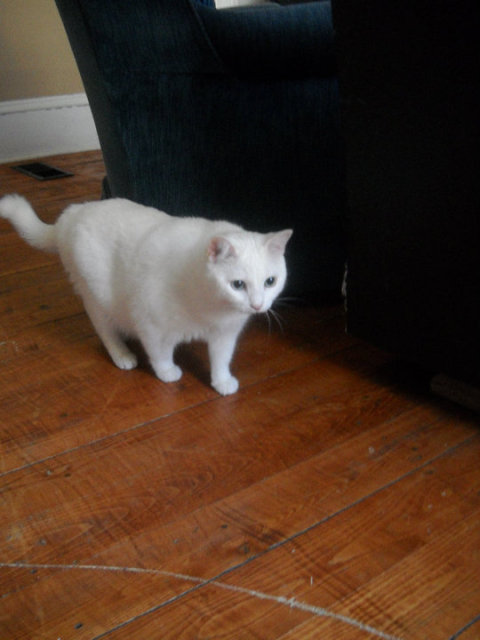 Breed Identification
Question
Zoey
I was curious if you could identify the b
Breed Identification
Question
Zoey
I was curious if you could identify the b